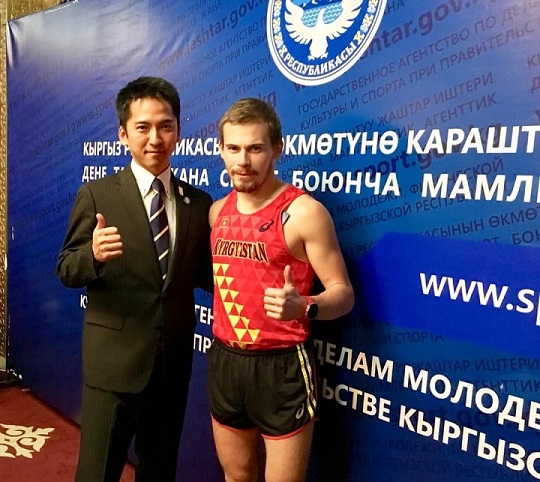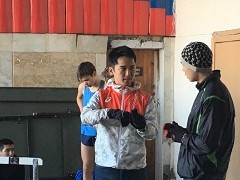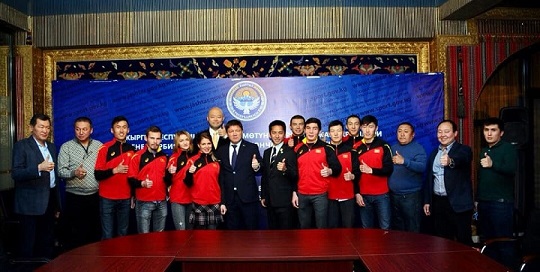【Sports for the future Vol.5】 A JOCV member with the experience of Hakone Ekiden leads Kyrgyz athletes to the Tokyo Olympics
2020.05.12
“Three Kyrgyz track and field team athletes have qualified for the Tokyo Olympic Games in four disciplines: the women’s 5,000 meters, 10,000 meters, marathon, and the men’s 1,500 meters. And as a member of the team I am accompanying them to the Olympics,” says TAKAHASHI Kento, who had also participated in the Hakone Ekiden (a prominent long-distance relay race in Japan) while he was a student.
As a member of Japan Overseas Cooperation Volunteer (JOCV), Takahashi helped develop Kyrgyz athletics community by coaching, training, and scouting young athletes until December 2019. Not only that, he also negotiated with a sports manufacturer to procure the uniforms of the national athletics team. He was commended for his achievements for his contribution to the development of track and field in the country and became the first Japanese to be personally awarded a medal by the government of Kyrgyzstan.

Takahashi (left) and Ilya Tyapkin who participated in the marathon at the Rio Olympics. Takahashi negotiated with a sports manufacturer to procure the uniforms that the Kyrgyz athletes wear
Assigned to Kyrgyzstan in January 2018, Takahashi was mainly involved in coaching top athletes, and scouting and nurturing the next generation of under-18 year old athletes. Among his tasks, he said he sometimes had a hard time dealing with the attitudes of the young athletes.
“One of the first Russian phrases I learned was ‘Don’t be lazy,’ as so many athletes were too laid-back and soon gave up. The athletes didn’t practice until being told to do so, but only after they, themselves, became convinced and practiced would their records grow. In order to change the consciousness of young athletes, I continued to ask them almost daily, ‘For what purpose did you come here (the practice field)?’” he recalls the hardships during the first days of his assignment.
"Not being forced to do something, but thinking by oneself and having the attitude to tackle it by oneself," was an important thing that Takahashi learned in his own athletics life, especially, for the Hakone Ekiden. In Kyrgyzstan, too, as he repeatedly advised the athletes, more and more of them voluntarily began to take part in the practice after six months.

Before the race with Zamir, who won the U18 national championship
“When I accompanied the team to the Central Asian Games held in Uzbekistan in 2019, Kyrgyzstan was the only country with no national uniforms or jerseys, and the athletes took part in the tournament wearing their own clothes which were all different and in ragged condition. When I asked the chairman of the track and field association, he said, ‘We can only afford to make this trip. There is no money left over for uniforms.’ I was keenly aware of my lack of power, but at the same time, I thought that changing the environment might lead to the improved motivation of the athletes.”
Therefore, Takahashi consulted with ASICS, a Japanese sports manufacturer, which agreed to provide uniforms for the national team.
Takahashi and his local colleagues designed the uniforms in red and yellow to match the Kyrgyz flag, and painted the flag on the chest. The uniforms were manufactured in Japan and arrived in Kyrgyzstan just before Takahashi returned to Japan. The presentation ceremony was also featured in the local media. The Kyrgyz team will wear this uniform at the Olympic Games to be held in Tokyo. Takahashi is also arranging training for them at Daito Bunka University, his alma mater, when they arrive in Japan.

Takahashi (center) and the national athletics team of Kyrgyzstan taking commemorative photographs at the uniform presentation ceremony
Although his assignment is completed, Takahashi continues to provide personal support to Kyrgyzstan, such as sending equipment. “The Kyrgyz people value things. They will wear shoes until they are completely worn out, and they will never forget the feelings of gratitude of the people around them. I feel like they have taught me many important things,” he says, looking back at his life in Kyrgyzstan. The strong ties between Takahashi and Kyrgyzstan, which were formed through his activities as a member of the JOCV, will continue.
scroll